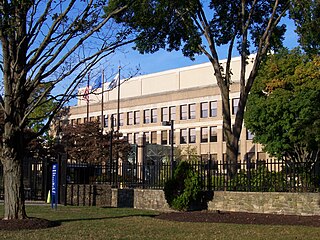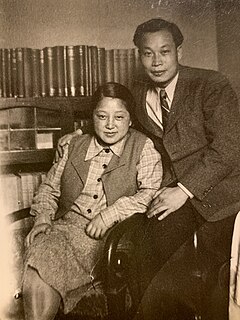
Pratt & Whitney is an American aerospace manufacturer with global service operations. It is a subsidiary of United Technologies (UTC). Pratt & Whitney's aircraft engines are widely used in both civil aviation and military aviation. Its headquarters are in East Hartford, Connecticut. As one of the "big three" aero-engine manufacturers, it competes with General Electric and Rolls-Royce, although it has also formed joint ventures with both of these companies. In addition to aircraft engines, Pratt & Whitney manufactures gas turbines for industrial and power generation, and marine turbines. As of 2014, the company reported having 31,500 employees supporting more than 11,000 customers in 180 countries around the world. In 2013, Pratt & Whitney's revenue totaled $14.5 billion.

Taiwan Province is a province of the Republic of China without administrative function. Its administrative powers have been transferred to the central and county governments.

The Convention or First Convention of Peking, sometimes now known as the Convention of Beijing, is an agreement comprising three distinct treaties concluded between the Qing dynasty of China and the United Kingdom, French Empire, and Russian Empire in 1860. In China, they are regarded as among the unequal treaties. The Ministry of Foreign Affairs of the Republic of China keeps the original copy of the Convention in the National Palace Museum in Taiwan.
China Post, full name China Post Group Corporation is the state-owned enterprise operating the official postal service of China, which provides the service in mainland China, excluding its special administrative regions, Hong Kong and Macau, which have their own postal service independent to the mainland's. The Corporation officially shares its office with the sub-ministry-level government agency State Post Bureau which regulates the national postal industry theoretically including the Corporation.
The Commission for Science, Technology and Industry for National Defense was a civilian ministry within the State Council of the People's Republic of China, responsible for setting policy for defense procurement. It was considered as the Chinese counterpart of DARPA of the USA. The ministry was formed in 1982 to centralize Chinese defense procurement and technology whose responsibility had been distributed among several agencies. In March 2008 COSTIND was merged into a new super bureaucracy called the Ministry of Industry and Information Technology (MIIT) and renamed as the State Administration for Science, Technology and Industry for National Defence (SASTIND). Former COSTIND deputy director, Chen Qiufa, was named as the head of SASTIND.
Intellectual property rights (IPRs) have been acknowledged and protected in the People's Republic of China since the 1980s. The People's Republic of China has acceded to the major international conventions on protection of rights to intellectual property. Domestically, protection of intellectual property law has also been established by government legislation, administrative regulations, and decrees in the areas of trademark, copyright, and patent. This has led to the creation of a comprehensive legal framework to protect both local and foreign intellectual property. Despite this, copyright violations are common in the PRC, The American Chamber of Commerce in China surveyed over 500 of its members doing business in China regarding IPR for its 2016 China Business Climate Survey Report, and found that IPR enforcement is improving, but significant challenges still remain. The results show that the laws in place exceed their actual enforcement, with patent protection receiving the highest approval rate, while protection of trade secrets lags far behind.

The transfer of sovereignty over Hong Kong, commonly known as the handover of Hong Kong, was the transformation of control over the United Kingdom's then colony of Hong Kong, pursuant to which it ceased to be a British Dependent Territory and became instead a special administrative region of the People's Republic of China on 1 July 1997. The returned territory comprised Hong Kong Island and the Kowloon Peninsula, which were respectively ceded to Britain in 1842 and 1860, as well as the New Territories, which were leased for 99 years from 1898. The transfer was arranged to coincide with the expiration of this lease on the previous day, 30 June 1997.

Qian Sanqiang, also known as Tsien San-Tsiang, was a Chinese nuclear physicist. Due to his central role in the development of China's nuclear industry and nuclear weapons program, he is referred to as China's "father of the atomic bomb."

Zhongtong Bus Holding Co., Ltd. is a Chinese bus manufacturing company based in Liaocheng, Shandong Province. The company is listed on the Shenzhen Stock Exchange, and is one of China's major bus makers.

The People's Republic of China (PRC) claims the island of Taiwan to be part its territory under its Constitution as the Taiwan Province. In combination with the Republic of China-controlled Fujian islands, it is usually referred to by mainland media as the Taiwan Region or Taiwan Area.

Chongqing University of Technology (CQUT) is a public research university in Chongqing. It was founded as Shiji Public School on 18 September 1940 by ordnance expert Lee Chenggan.
First Ministry of Machine Industry of the PRC (中华人民共和国第一机械工业部), one of the central offices in the People's Republic of China.
The Second Ministry of Machine Building (第二机械工业部) was a government ministry of the People's Republic of China which oversaw the nuclear industry. It was established in August 1952. In April 1988 it became part of the newly created Ministry of Energy Resources.
The Third Ministry of Machine Building of the People's Republic of China (中华人民共和国第三机械工业部) was a former government ministry of China, which oversaw the aviation industry.
The Fourth Ministry of Machine Building (中华人民共和国第四机械工业部), one of the central offices in the People's Republic of China, who oversaw the electronics industry.
Fifth Machine Industry Ministry of the PRC (中华人民共和国第五机械工业部), one of the central offices in the People's Republic of China, created on Sept. 2, 1963, who oversaw production of tank equipment and artillery.
Sixth Ministry of Machine-Building of the PRC (中华人民共和国第六机械工业部), one of the central offices in the People's Republic of China, created on Sept. 2, 1963, who oversaw the shipbuilding industry.
Eighth Ministry of Machine-Building of the PRC (中华人民共和国第八机械工业部), one of the central offices in the People's Republic of China, established in 1964, which inter alia oversaw the defense industry.
China's anti-satellite (ASAT) program has been under development since 1964. The ASAT program has since been moved from Program 640 to Program 863, the General Armaments Department and the State Administration for Science, Technology and Industry for National Defence. Since its inception, the ASAT program has made progress on the development of three ASAT capable Systems: direct fire, directed-energy weapon, and microsatellites. Tests of these systems have either been directly acknowledged by the PRC, or reported on as ASAT capable. China is pursuing a broad and robust array of counterspace capabilities, which includes direct-ascent antisatellite missiles, co-orbital antisatellite systems, computer network operations, groundbased
satellite jammers, and directed energy weapons.
Liu Jianfeng is a Chinese retired engineer and politician. From 1989 to 1993 he was Governor of Hainan Province, where he had a highly antagonistic relationship with the Party Chief Deng Hongxun. He also served as Director of the Civil Aviation Administration of China and Vice-Minister of the Ministry of Electronics Industry.










